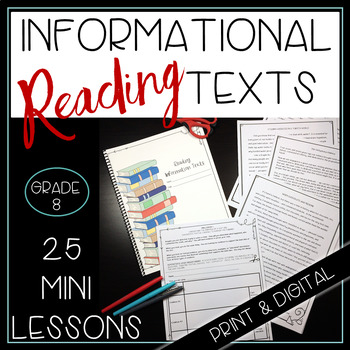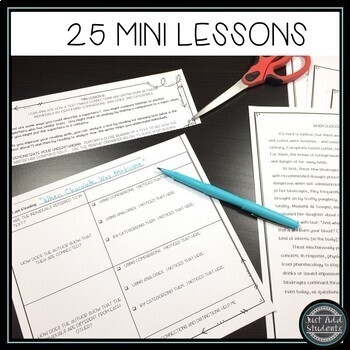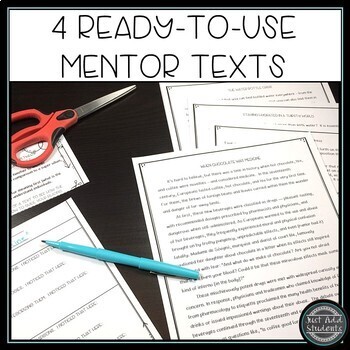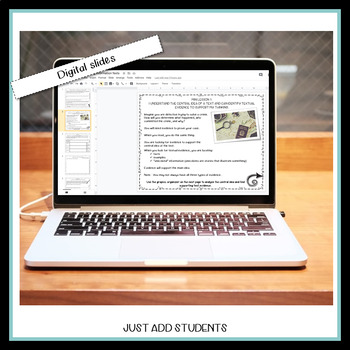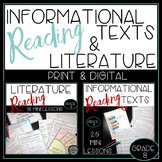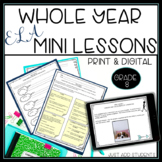Reading Information Texts Grade 8 Whole Year Mini Lessons Print and Digital
- Zip
- Google Apps™
- Microsoft OneDrive

What educators are saying
Also included in
- Digital + Print! No planning! Save tons of time using these mini lessons to teach all your 8th grade reading information texts and reading literature lessons! Spend more time helping your students and less time planning and searching for resources!Plus, you can use these lessons with any texts. YouPrice $17.99Original Price $25.98Save $7.99
- Everything you need to teach 8th grade ELAR! All the CCSS are addressed with this gigantic bundle! You'll be set for the year with all the mini lessons, lesson plans, checklists, and mentor texts. Digital and Print.This is going to save you so much time!This is what you'll get:Reading Literature (Price $60.00Original Price $75.93Save $15.93
Description
No planning -- the entire year-- digital & print! Meet the needs of your students without searching for ways to do it AND teach all of the RI 8th Grade standards. Focus on your students instead of searching for texts with these 25 ready-to-use Reading Information text mini lessons!
Ready to use today!
Here's what teachers are saying about my mini lessons:
- "I love how this resource breaks down each step of the process for students to make it more manageable."
- "Your organization is outstanding, and your thorough planning (with ALL your mini-lessons) is appreciated more than you know. Even if I, myself, spent days creating a set of mini-lessons to use in class, I don't think they would give me the the comfort and excitement that yours do."
- "I love the option of creating a workbook for them at the beginning of the unit, and I especially love the "I Can" statements at the top of each lesson (my principal will love that, too!). The teacher pages are a huge part of what makes this so amazing, though; your instructions, notes, standards, and lesson calendars are so thorough and incredibly helpful. The name of your store really says it all...Just Add Students!!"
This is what you'll get:
This resource includes:
- 25 Mini Lessons -- both print & digital
- Two cover choices (one full-color, one blackline) that you can use to create a workbook for your students
- 25 standards posters written in student-friendly language
- four nonfiction texts that you can use right away to start teaching these skills! Included two texts that argue opposite points.
- lesson planning charts
- Answer Key using the nonfiction texts in the zip file. This will give you an idea of how to use the mini lessons with other texts. You may wish to choose your own nonfiction texts.
- Editable teacher checklist that will help you track what lessons your students have completed - great for differentiation!
- teaching tips and video to help you get the most out of this jam-packed resource!
Each mini lesson includes:
- a manageable portion of the RI standards
- student friendly restatement of the standard
- easy-to-follow explanation of the standard
- a “Demonstrate your Understanding” that directs the student’s task for the day
- print version: students can cut off the bottom portion of the page to use as an exit card or assessment
- digital version: students can turn in the activity they completed
- students can add notes for each lesson to a digital or print notebook to create a reading resource
- a “Reflection Question” focuses on higher order thinking skills and helps summarize the mini lesson. Ideal "wrap up" or use as a warm up for the next class.
The 25 mini lessons address:
1. central idea & textual evidence
2. inference based on evidence
3. development of the central idea & supporting details
4. objective summary
5. comparisons, analogies, categories
6. text connections & distinctions between individuals
7. text connections & distinctions between ideas
8. text connections & distinctions between events
9. vocabulary clarification
10. figurative language
11. connotative meaning
12. technical language
13. distinguishing figurative, connotative, and technical language
14. word choice and tone
15. paragraph structure
16. sentence and paragraph development
17. point of view
18. author's response to opposing evidence
19. advantages of various media presentations
20. disadvantages of various media presentations
21. deconstruct and evaluate an argument
22. assess argument's validity
23. evaluate conflicting information on the same topic
24. evaluate points in opposing arguments that differ
25. assessing the variety of nonfiction texts that challenge the reader
Reasons to love this workhorse of a resource:
- perfect for blended, distance, or in-person learning!
- project slides on your white board or use in your screen cast or video.
- use to differentiate lessons
- craft literature circle lessons
- create GATE activities
- create small groups, reteach skills, or move students on to more complex texts
- decrease scaffolding and increase independence
- provide additional support by repeating the lessons as often as needed to achieve student independence and increased text complexity
- assess mastery. Collect exit cards or slides and use for formative or summative assessments
- build background knowledge using nonfiction texts your students are interested in
- ready to use today
You will be able to increase text complexity and student independence by using the mini lesson activities repeatedly throughout the school year with any nonfiction text.
This can easily be used as a cross-curricular activity.
Use this resource again and again with your favorite nonfiction texts!
This is going to save you so much time!
Please view the preview to see what this product includes. You will receive four nonfiction texts in this resource, but the mini lessons can be used with your favorite nonfiction texts!
The zip file contains five files:
- print mini lesson file
- digital access document
- answer key
- four informational texts
- editable teacher checklists
Looking for more reading support? Here are the 6th Grade RI and RL mini lesson resources:
Mini Lessons for Teaching Reading Informational Texts and Literature
Click here to take a look at my other mini lessons.
21 Mini Lessons for Teaching Narrative Writing
Book Talks: A Guide to Running Successful Book Talks in your Classroom
Dystopian Novels: Ready-to-Go Lessons for Literature Circles
♡
I’d love to have you follow my store! Click on the green star to get the latest freebies, sales, and products.
I can't wait to hear from you! I read and respond to all feedback – please let me know how you use this resource & earn TPT credits at the same time! Questions? Pop them in the Q&A below and I'll get right back to you!
♡
With gratitude,
Marypat

